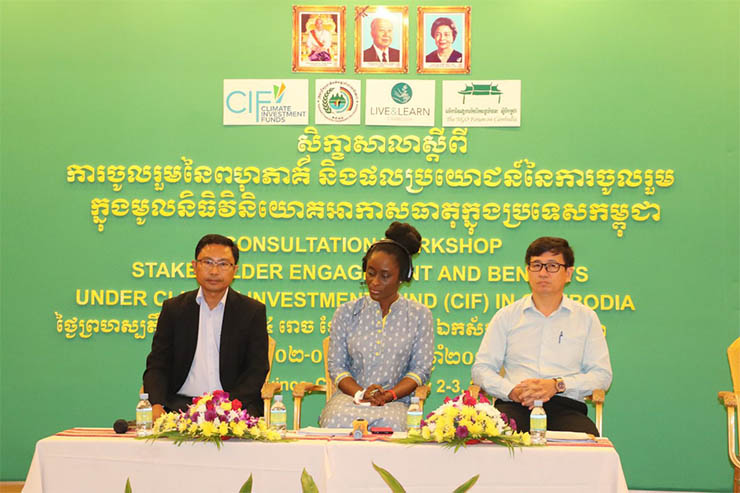
With supporting from Climate Investment Fund (CIF) and Caritas Switzerland, Live and Learn Cambodia and the NGO Forum on Cambodia hosted a consultative workshop on Local Stakeholder Engagement and Benefits under CIF investments in Cambodia on May 2-3, 2019 at Soma Devi Hotel, Siem Reap province. There were total of 93 participants (19 women) from a respective government official, private sector, civil society organization, academia, community, and student attended the two days of the workshop. The primary objectives were to identify and capture evidence and lessons to inform on-going CIF activities (based on joint lessons from Pilot Program for Climate Resilience (PPCR) and Scaling Up Renewable Energy Program (SREP) in Cambodia) and to inform civil society stakeholders of the benefits of actively engaging them in all stages of the delivery of the program. Through the evaluation and Learning study has built on existing findings and research on local CSO engagement to reflect the effectiveness and benefits of CIF programs in Cambodia and to provide constructive feedback or inputs to improve the programs’ implementation and replication in the future. The findings from the studies have been well documented and will be further consulted with stakeholder, and additional feedback and inputs incorporated. This workshop, under the learning component, was provided a platform for stakeholders to discuss, share insights and experience. The three main specific objectives aimed at; 1) provide an opportunity for stakeholders to share experience, capture knowledge and learn about CIF Programming, MDBs, climate finance mechanisms, and CSO approaches in stakeholder engagement under their respective programming; 2) validate results, including reports and case studies, of the study on Local Stakeholder Engagement and Benefits under CIF Investment in Cambodia; and 3) establish dialogue, communication, and networking relevant to climate change actions and climate financing.
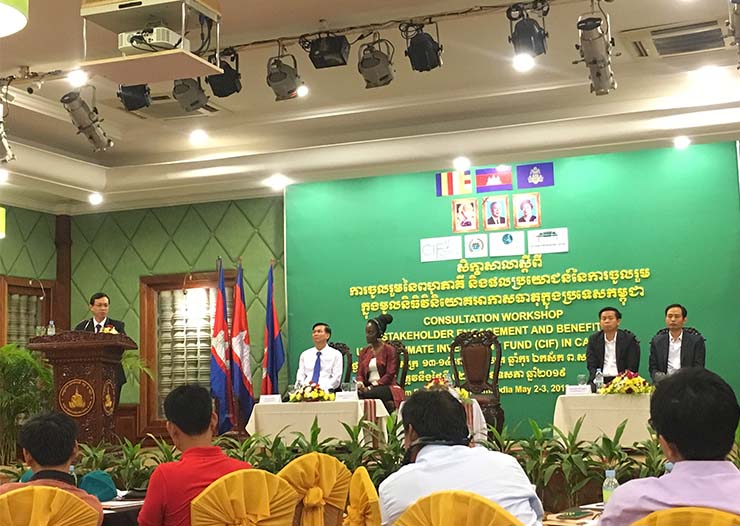
In the open remark session, H.E Chuop Paris, Deputy Secretary-General of National Council for Sustainable Development provided the opening speech that local stakeholder engagement from different backgrounds is important to cope with climate change and to effectively use climate finance. All of these opportunities could not happen without various stakeholder collaboration.
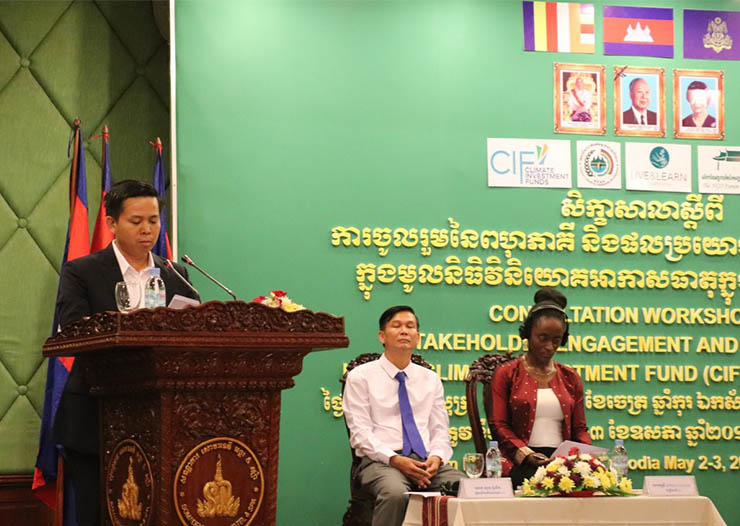
Dr. Tek Vannara, Executive Director of the NGO Forum on Cambodia, however, briefed the numerous opportunities of funding sources relation to climate change mitigation and adaptation in Cambodia through GEF, GCF, AF, REDD+, and CIF.
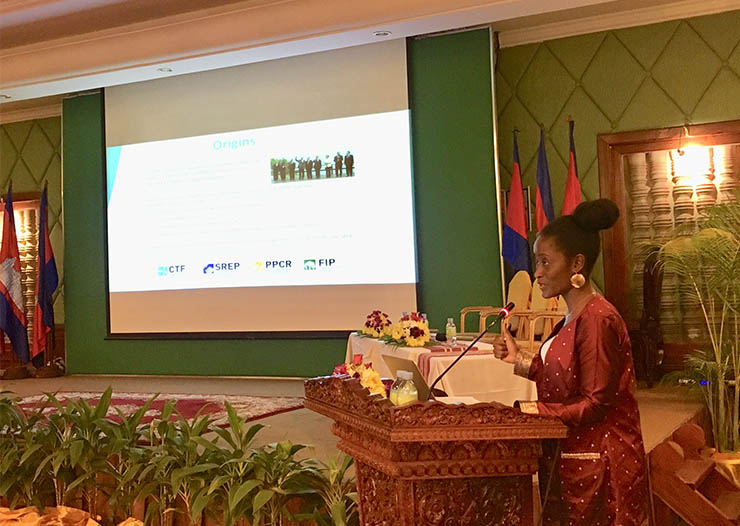
Ms. Dora N Cudjoe, CIF operation officer presented the principle, opportunity and stakeholder engagement in CIF funding process. She noted the major program of CIF such as Clean Technology Fund (CTF), Forest Investment Program (FIP), Scaling Up Renewable Energy Program (SREP) and Pilot Program Climate Resilience (PPCR). In Cambodia, regarding CIF, Government of Cambodia has developed investment plans under the PPCR, SREP, and FIP to accelerate action in priority areas.
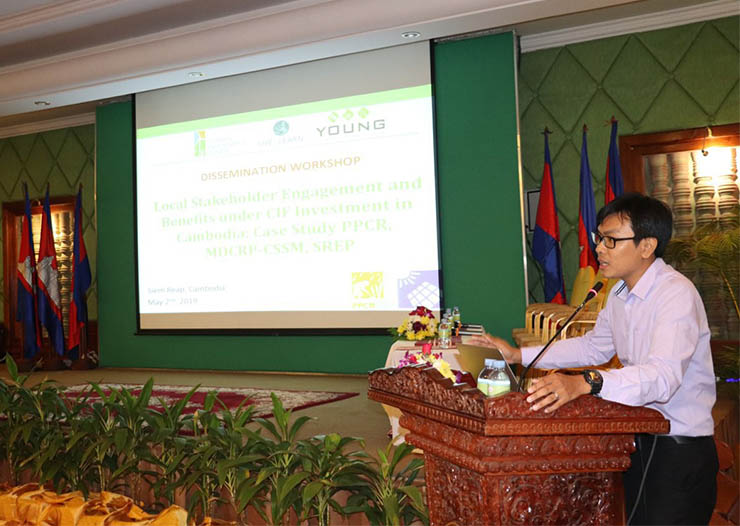
Mr. Chou Phanith, presented the Research findings on local stakeholder engagement which is stakeholder analysis framework discussed on 4 main areas, including: expertise, interest, willingness to engage, necessity of engagement. Key findings of his research reveal current position of LSE in General via facilitating and consultation in both vertical and horizontal engagement, little stakeholders’ participation in facilitating of proposal development stage, received a chance in consultation and partnership for final version of project. Influence of LSE in local benefits and republications including technological solution, financial solutions and institutional change. Climate-resilient Agriculture through PPCR-Cambodia including LSE in participation process in PPCR, consultation process, partnership. There some indicative lesson learnt from the research are: Local stakeholders engagement is really important in all stages including development, planning, implementation, capacity building, monitoring and evaluation, Private sector engagement is still very limited, SREP supports energy access, particularly gender, particularly in remote and rural areas, Strengthen the roles of civil societies and communities, Opportunities for scaling, particularly under Civil Society Support Mechanism and replicabilities to in other themes, such as SREP and FIP.

There are remarkable discussions during the panel discussion session. Cambodia Climate Change Strategic Plan (CCCSP) has been developed and endorsed by the Government that is a cross-cutting issues and it requires better local stakeholders’ engagement. The study is very interesting and useful, particularly participation of local communities remain low, particularly during the design of the projects, Development stage and planning stage are crucial and mostly founds a lack of mechanism in stakeholder engagement, Engage more study on stakeholder engagements and willing to collaborate in the future study, There are platforms which have been used for stakeholders engagement: among non-state actors and state actors and non-state actors, Participatory evaluation and independent evaluations, Stakeholder engagement help improving discussion and feedbacks and take action together, which is quite interesting!
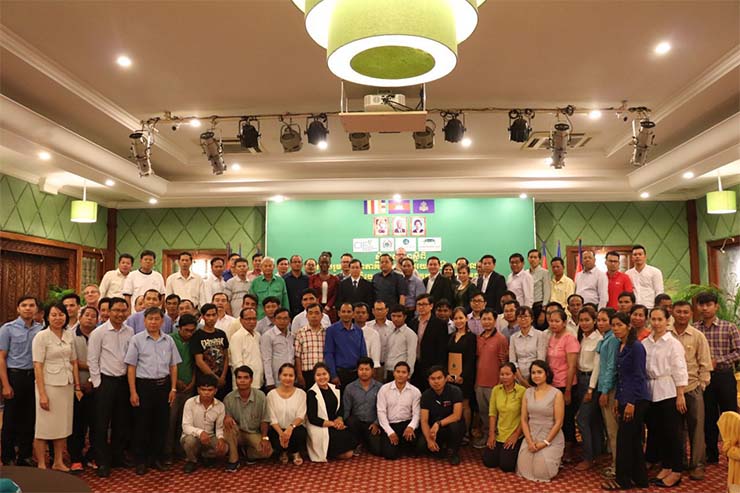
Last but not least, closing remarks, H.E Chuop Paris, Deputy Secretary-General of National Council for Sustainable Development impressed to fully participation of all stakeholders and workshop organizers to engage all relevant stakeholders to discuss and learn through funding mechanism of CIF as well as how it done so far in project implementation in Cambodia. He thanks for all participants spending value time to share knowledge and experience to develop common future action plan compliance with Climate Investment Fund mechanism and climate change issue in Cambodia.